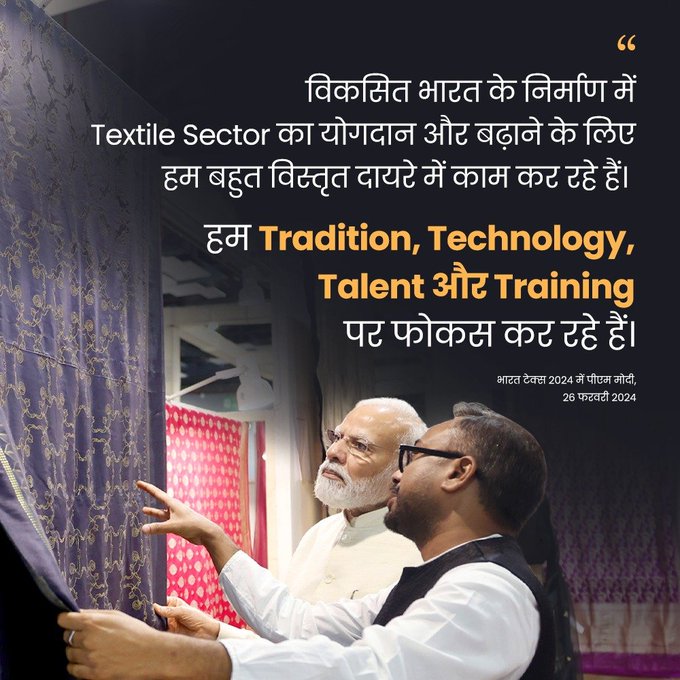PM Modi Launches Bharat Tex 2024, A Fusion of Tradition and Innovation in Indian Textiles
PM Modi Launches Bharat Tex 2024, A Fusion of Tradition and Innovation in Indian Textiles
Prime Minister Narendra Modi's inauguration of Bharat Tex 2024 at Bharat Mandapam in New Delhi marked a significant milestone for India's textile sector. Here are the key points from his speech
Inauguration and Exhibition: PM Modi inaugurated Bharat Tex 2024, emphasizing the event's importance as it showcases in two of India's largest exhibition centers, Bharat Mandapam and Yasho Bhoomi, with over 3000 exhibitors and traders from around 100 countries, and approximately 40,000 visitors.
Integration of Tradition and Modernity: He highlighted how Bharat Tex 2024 embodies the fusion of India's rich textile tradition with modern talent and technology, aiming to showcase style, sustainability, scale, and skill in the textile industry.
National Unity and Textile Diversity: Modi praised the expo for exemplifying 'Ek Bharat Shreshtha Bharat' by presenting a diverse array of textile traditions from across India, demonstrating the depth and capability of the Indian textile tradition.
Textile Sector's Significance: Acknowledging the textile value chain's stakeholders, including weavers with generational experience, Modi emphasized the sector's connection to Viksit Bharat's four pillars: the poor, youth, farmers, and women, underlining the event's growing significance.
Government Initiatives: The Prime Minister detailed efforts to enhance the textile sector's role in Viksit Bharat, focusing on tradition, technology, talent, and training, and outlined the 'Five Fs' strategy from Farm to Foreign. He mentioned support for the MSME sector, direct sales, and online portals to connect artisans with markets.
Infrastructure and Employment: Modi announced plans for seven PM MITRA Parks to create opportunities across the textile sector, emphasizing modern infrastructure to reduce logistics costs, and highlighted the textile sector's role in empowering women and rural populations.
Support for Traditional and Emerging Sectors: He discussed support for cotton farmers with Kasturi Cotton, and measures for the jute and silk sectors, alongside the promotion of technical textiles through the National Technical Textiles Mission.
Skill Development and Innovation: Modi stressed the importance of skill development, increasing NIFT institutes to 19, and connecting local weavers and artisans to NIFTs. He highlighted the Samarth Scheme for capacity building and skill development, particularly among women.
Vocal for Local and Global Aspirations: Emphasizing the 'Vocal for Local' movement, Modi encouraged the textile industry to aim for global markets, reflecting on the government's role in facilitating exhibitions and malls for small artisans.
Economic Growth and Quality Standards: He shared the significant growth of the Indian textiles market, with an increase in production and development of new BIS standards, resulting in doubled FDI in the sector.
Response to COVID-19 and Future Prospects: Recalling the textile industry's contribution during the COVID-19 pandemic with PPE Kits and Face Masks, Modi expressed confidence in India's potential to become a global export hub for textiles.
Encouragement for Innovation and Global Leadership: The Prime Minister urged the textile sector to innovate, particularly in areas like textile equipment manufacturing and textiles used in the medical field, and to lead global fashion trends rather than follow.
In concluding, Prime Minister Modi reassured the textile sector of the government's support and encouraged the industry to adopt a visionary approach that caters to global needs and diversifies markets, underlining the government's readiness to act as a catalyst for fulfilling the sector's aspirations.


